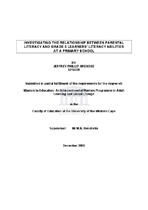| dc.contributor.advisor | Hendricks, M.N | |
| dc.contributor.author | Arendse, Jeffrey Phillip. | |
| dc.contributor.other | | |
| dc.contributor.other | Faculty of Education | |
| dc.date.accessioned | 2013-10-11T09:10:43Z | |
| dc.date.available | 2009/05/15 08:44 | |
| dc.date.available | 2009/05/15 | |
| dc.date.available | 2013-10-11T09:10:43Z | |
| dc.date.issued | 2006 | |
| dc.identifier.uri | http://hdl.handle.net/11394/2255 | |
| dc.description | Magister Educationis (Adult Learning and Global Change) - MEd(AL) | en_US |
| dc.description.abstract | The study set out to investigate the relationship between parental literacy levels and the literacy abilities of their children who were Grade 3 learners at a primary school in an impoverished area. The study initially hypothesized that there is a correlation beteen the literacy level of parents and the literacy abilities of their children. More specifically, it assumed that the higher the lieracy leevls of the parents, the stronger the literacy abilities of their Grade 3 child would be. | en_US |
| dc.language.iso | en | en_US |
| dc.publisher | University of the Western Cape | en_US |
| dc.subject | Literacy programmes | en_US |
| dc.subject | Elementary education | en_US |
| dc.title | Investigating the relationship between parental literacy and Grade 3 learners' literacy abilities at a primary school | en_US |
| dc.type | Thesis | en_US |
| dc.rights.holder | University of the Western Cape | en_US |
| dc.description.country | South Africa | |

